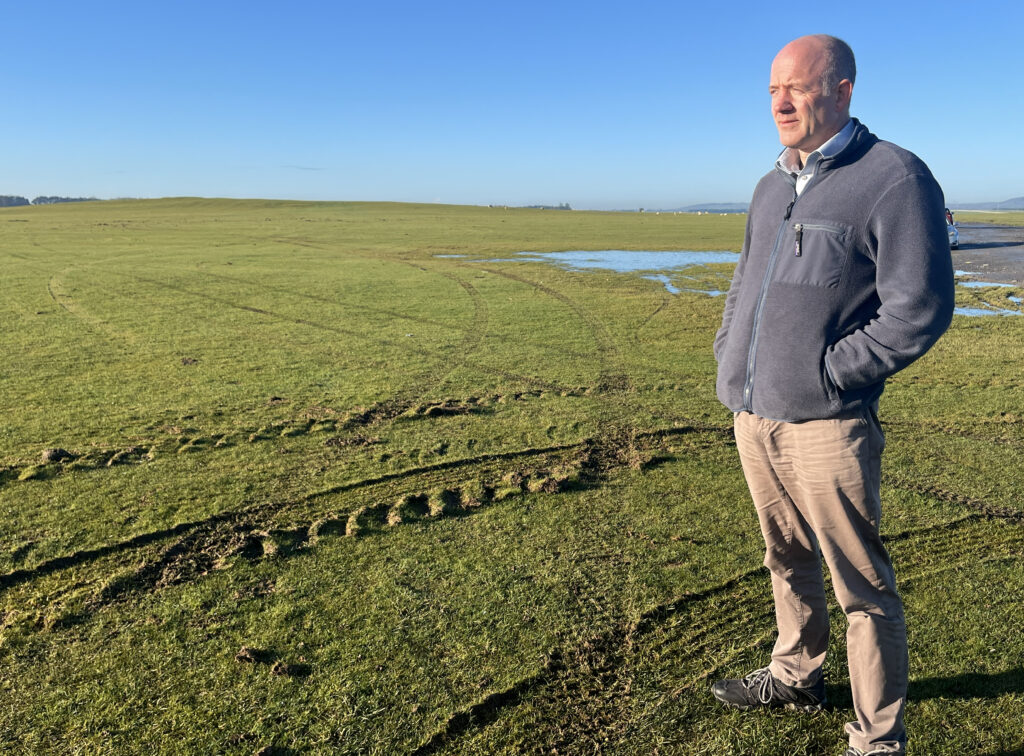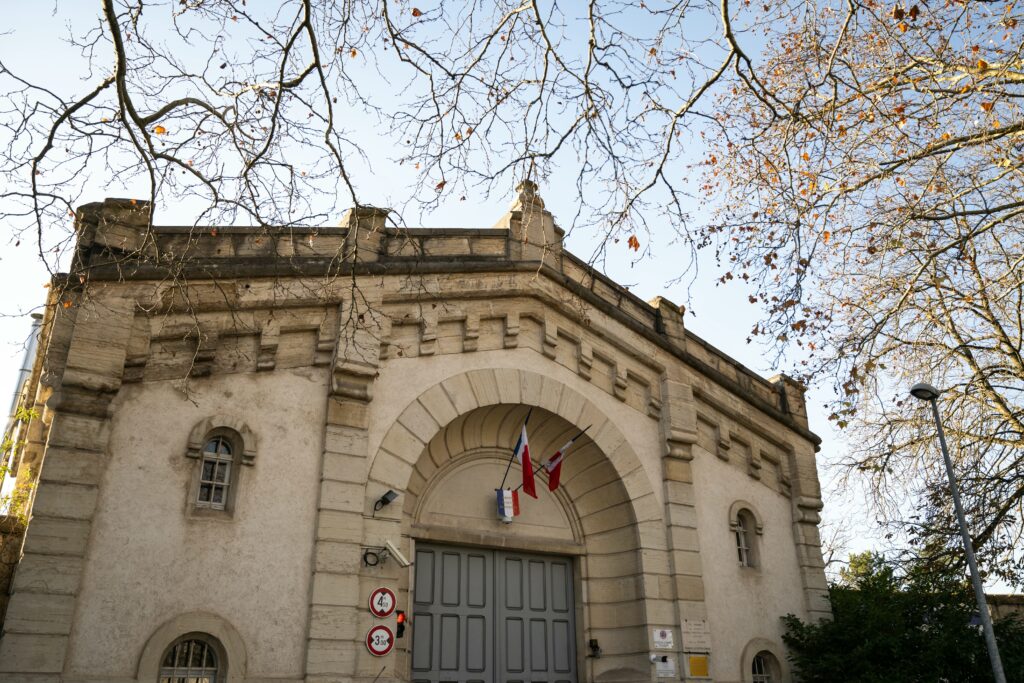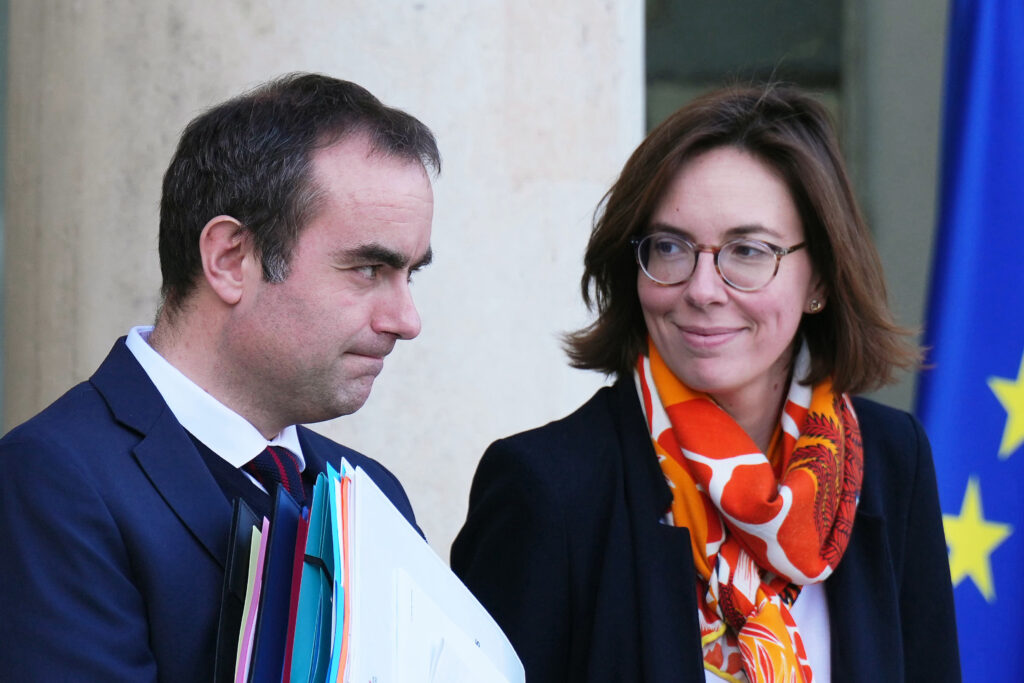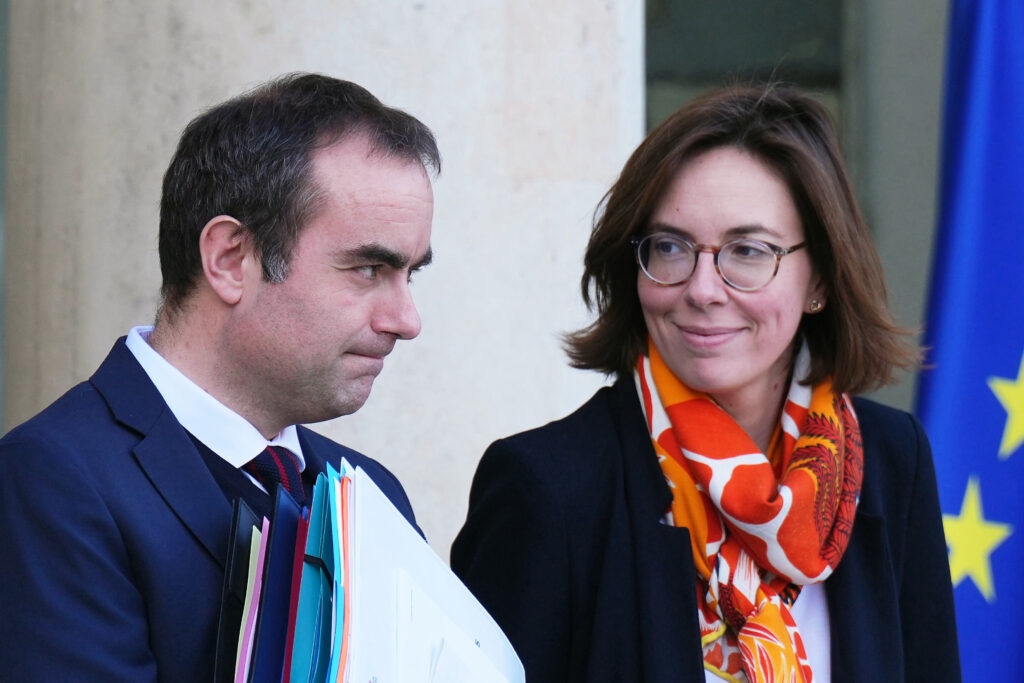“On est tous tombés amoureux!” Aux États-Unis, la Wembamania à tout âge
Pour Lydia, huit ans, c’est Noël avant l’heure: ses parents l’emmènent voir son idole, Victor Wembanyama. Maillot des San Antonio Spurs sur le dos, elle réalise un rêve, à l’image de milliers de supporters de basket aimantés par le surdoué français.”C’est la première fois qu’on vient le voir. Il est incroyable, il peut tout faire: contrer, marquer à trois points, claquer un dunk. C’est un génie”, sourit son père, Xavier Herrera, avant la rencontre contre les Wizards de Washington dimanche (victoire des Spurs 124-113).La famille a roulé plus de deux heures pour voir son chouchou dans l’enceinte de la capitale américaine. Ils sont loin d’être les seuls. Son nom apparaît sur les tee-shirts noir et blanc des supporters et nourrit les discussions.Les rangées, d’habitude parsemées de sièges vides, sont bondées. Plus de 20.000 personnes sont venues admirer l’envergure de son talent, faisant exploser le record d’affluence de la saison.”C’est une perche, on ne peut pas le louper!”, s’amuse Jacob Ottinger, un fan des Spurs de la première heure, en référence aux 2,24 mètres du Français âgé de 21 ans. Il l’adule depuis son arrivée, il y a deux ans. “La chose la plus impressionnante chez lui, c’est sa mentalité. Il travaille dur, il a toujours envie de gagner et, surtout, il ne se comporte pas comme une superstar. On est tous tombés amoureux de lui”, l’encense le supporter de 27 ans, lunettes carrées et barbe brune.Pour l’occasion, il a enfilé le maillot des “Mets 92”, le club de Levallois-Perret, près de Paris, où Victor Wembanyama a crevé l’écran avant son arrivée dans la cour des grands, en NBA.- “Tour de garde” -Le natif des Yvelines, en région parisienne, réalise un début de saison étincelant avec les Spurs, avec une moyenne de 25 points et 12 rebonds par match. La franchise de San Antonio s’installe dans le haut du classement, à la deuxième place, avec les trois quarts de ses rencontres remportées.”Je ne m’attendais vraiment pas à une telle entame de saison. Je pensais qu’on aurait une saison de transition, mais à la place, on se projette déjà sur le premier tour des playoffs et pourquoi pas, ensuite, la finale de conférence!”, se réjouit Xavier Herrera. Pour lui, la finale de la NBA Cup, perdue par les Spurs à Las Vegas face aux New York Knicks il y a une semaine doit servir de “tremplin” pour conquérir des titres.Sa seule inquiétude: la santé de son protégé. Blessé au mollet gauche et indisponible de longues semaines, Wembanyama, comparé à un “alien” par la superstar des Lakers Lebron James, reprend ses marques en douceur, avec un temps de jeu réduit. Dimanche à Washington, il a foulé 22 minutes le parquet et passé toute la fin de la partie sur le banc.”Le mieux est de le laisser se reposer lors des matches moins importants pour qu’on puisse le garder toute la saison”, assure Carlos Salas, 53 ans, venu assister à la rencontre avec son fils de 14 ans.Ce qui impressionne le natif de San Antonio, c’est son mélange d'”aisance” et de “présence”. “Quand il est en face, tu ne peux simplement pas entrer dans la raquette et shooter. C’est une vraie tour de garde.” Pour lui, Wembanyama est “clairement une future légende du basket”.Un talent tricolore en rappelle un autre. “Je suis un grand fan de Tony Parker!”, lance, la mine joviale, Jacob Ottinger. “Il a marqué d’une empreinte indélébile notre équipe”, avec notamment quatre titres de NBA.Alors, pour conquérir le prochain, “qui de mieux qu’un autre prodige français?”
Face aux menaces, l’Irlande s’interroge sur sa politique de défense
Armée sous-financée, équipements vieillissants: les capacités militaires de l’Irlande, mais aussi sa politique historique de neutralité, reviennent au coeur du débat dans le contexte actuel de menaces en Europe, à l’approche de la présidence tournante de l’UE en juillet.Début décembre, la détection de drones près de Dublin sur l’itinéraire de vol du président ukrainien Volodymyr …
Face aux menaces, l’Irlande s’interroge sur sa politique de défense Read More »
Double évasion de Dijon: le second évadé mis en examen et écroué
Le deuxième évadé de la double évasion en novembre de la prison de Dijon, arrêté jeudi à Marseille après trois semaines de cavale, a été mis en examen et écroué, a indiqué lundi le parquet dijonnais.Âgé de 19 ans, le jeune homme a été mis en examen à Dijon pour “évasion en bande organisée en état de récidive légale” et placé en détention provisoire “hors de Dijon”, a précisé à l’AFP le procureur Olivier Caracotch. Le jeune homme, considéré comme dangereux par la justice, a été interpellé dans les quartiers nord de Marseille, sa ville natale, par la Brigade de recherche et d’intervention (BRI), après une traque menée notamment par les policiers de la Brigade nationale de recherche des fugitifs.Il a été arrêté seul et non armé, selon le parquet de Dijon, dans un appartement de la cité des Rosiers, copropriété dégradée dans un quartier connu pour abriter du trafic de stupéfiants.Avant son évasion il était en détention provisoire pour tentative d’assassinat et association de malfaiteurs.Le matin du 27 novembre, le jeune homme et un autre détenu âgé de 32 ans s’étaient évadés de la maison d’arrêt de Dijon après avoir scié les barreaux de leur cellule respective à l’aide d’une lame de scie à métaux, vraisemblablement livrée par drone, et utilisé des draps pour s’enfuir.Le détenu trentenaire, en détention provisoire pour violences conjugales, avait été repris 24 heures seulement après sa cavale, arrêté dans le bar d’un village de Saône-et-Loire. Il a également été mis en examen pour évasion en bande organisée et association de malfaiteurs.Deux complices présumés des évadés, une femme de 25 ans et un jeune homme de 19 ans, ont également été mis en examen et placés en détention provisoire.
Budget: Lecornu consulte une dernière fois, avant un conseil des ministres et une loi spéciale
Le Premier ministre Sébastien Lecornu poursuit lundi ses consultations des formations politiques, avant un conseil des ministres en fin de journée pour présenter en urgence une loi spéciale destinée à sortir de l’impasse budgétaire, après l’échec de l’examen parlementaire du budget de l’État.Dernier recours pour permettre de financer temporairement l’État et les administrations, un vote devrait intervenir d’ici mardi, à l’Assemblée et au Sénat, pour entériner cette loi spéciale qui vise à reconduire provisoirement le budget 2025, avant la reprise de nouvelles discussions budgétaires en janvier. Objectif annoncé par la ministre des Comptes publics Amélie de Montchalin: qu’une véritable loi de finance 2026 soit adoptée avant “la fin janvier”. “Les quinze premiers jours de janvier”, a même renchéri lundi le rapporteur du budget à l’Assemblée Philippe Juvin (LR) sur BFMTV/RMC.Après l’échec vendredi d’une commission de sénateurs et députés à trouver un accord, le Premier ministre était à la tâche dès dimanche, entamant une nouvelle série de consultations des partis politiques “pour trouver les conditions d’une solution”.Il a notamment discuté avec les chefs des groupes parlementaires Renaissance et Horizons et les présidents des groupes Modem et Liot.Les responsables du Parti socialiste, partenaires privilégiés de M. Lecornu lors de l’examen du budget de la Sécurité sociale, et à qui il a concédé notamment la suspension de la réforme des retraites, seront reçus lundi à 10H30. Le Premier ministre doit aussi s’entretenir avec le Parti communiste (15H00), les Ecologistes (16H00) et Les Républicains (17H30). “Nous leur disons deux choses simples. +Est-ce qu’on est bien d’accord que notre objectif collectif, c’est qu’entre maintenant et fin janvier, il y ait un budget pour la France, un vrai budget, pas un budget service minimum+”, a détaillé Amélie de Montchalin dimanche soir.”Et la deuxième chose qu’on dit, c’est que pour qu’il y ait un budget, il faut qu’il y ait un compromis”, a-t-elle ajouté.- recours au 49.3 -A l’issue de ces discussions, un Conseil des ministres destiné à présenter le projet de loi spéciale est prévu en fin de journée, au retour d’Emmanuel Macron d’Abou Dhabi. Dans la foulée, les commissions des Finances de l’Assemblée nationale et du Sénat auditionneront lundi soir et mardi le ministre de l’Économie Roland Lescure et Mme Montchalin. L’objectif est que ce texte puisse être voté mardi par les deux chambres.Comme l’année dernière, il ne devrait y avoir “aucune voix contre”, a pronostiqué sur RTL le président insoumis de la commission des Finances Eric Coquerel. Mais il faudra dès la rentrée reprendre les discussions pour tenter de trouver un budget 2026. Reste qu’après deux mois de discussions qui n’ont pas permis d’aboutir, le doute subsiste sur la capacité du Premier ministre à obtenir ce compromis, entre une droite sénatoriale attachée aux économies et aux baisses d’impôts et une Assemblée où la gauche réclame plus de recettes et moins de coupes budgétaires. Des voix s’élèvent de plus en plus fort pour réclamer que le Premier ministre ne prolonge pas la navette parlementaire indéfiniment et utilise l’article 49.3 de la Constitution, alors que M. Lecornu s’est engagé à ne pas y recourir, à la demande du Parti socialiste. “Je pense que le Parti socialiste sera d’accord pour un 49.3. Ce sont des gens responsables, il faut simplement les traiter”, a estimé lundi le rapporteur Philippe Juvin.Selon lui, le texte soumis au 49.3 devrait “partir de celui voté au Sénat” en y ajoutant des amendements “sur lesquels on se met rapidement d’accord”.Dans ce cas, le 49.3 ne serait “pas un passage en force” mais “un aveu d’échec du parlementarisme”, a estimé sur TF1 le chef des députés MoDem Marc Fesneau.Samedi, le patron de LR Bruno Retailleau a aussi enjoint au Premier ministre de dégainer cette arme constitutionnelle pour octroyer un budget “responsable au pays”, avec “moins d’impôt et de dépenses”.Mais pour Amélie de Montchalin, il y aura dans le budget “des hausses d’impôts qu’il faudra cibler, choisir, décider ensemble. Et puis il y aura des économies qu’il faudra cibler, choisir et décider ensemble”.
Budget: Lecornu consulte une dernière fois, avant un conseil des ministres et une loi spéciale
Le Premier ministre Sébastien Lecornu poursuit lundi ses consultations des formations politiques, avant un conseil des ministres en fin de journée pour présenter en urgence une loi spéciale destinée à sortir de l’impasse budgétaire, après l’échec de l’examen parlementaire du budget de l’État.Dernier recours pour permettre de financer temporairement l’État et les administrations, un vote devrait intervenir d’ici mardi, à l’Assemblée et au Sénat, pour entériner cette loi spéciale qui vise à reconduire provisoirement le budget 2025, avant la reprise de nouvelles discussions budgétaires en janvier. Objectif annoncé par la ministre des Comptes publics Amélie de Montchalin: qu’une véritable loi de finance 2026 soit adoptée avant “la fin janvier”. “Les quinze premiers jours de janvier”, a même renchéri lundi le rapporteur du budget à l’Assemblée Philippe Juvin (LR) sur BFMTV/RMC.Après l’échec vendredi d’une commission de sénateurs et députés à trouver un accord, le Premier ministre était à la tâche dès dimanche, entamant une nouvelle série de consultations des partis politiques “pour trouver les conditions d’une solution”.Il a notamment discuté avec les chefs des groupes parlementaires Renaissance et Horizons et les présidents des groupes Modem et Liot.Les responsables du Parti socialiste, partenaires privilégiés de M. Lecornu lors de l’examen du budget de la Sécurité sociale, et à qui il a concédé notamment la suspension de la réforme des retraites, seront reçus lundi à 10H30. Le Premier ministre doit aussi s’entretenir avec le Parti communiste (15H00), les Ecologistes (16H00) et Les Républicains (17H30). “Nous leur disons deux choses simples. +Est-ce qu’on est bien d’accord que notre objectif collectif, c’est qu’entre maintenant et fin janvier, il y ait un budget pour la France, un vrai budget, pas un budget service minimum+”, a détaillé Amélie de Montchalin dimanche soir.”Et la deuxième chose qu’on dit, c’est que pour qu’il y ait un budget, il faut qu’il y ait un compromis”, a-t-elle ajouté.- recours au 49.3 -A l’issue de ces discussions, un Conseil des ministres destiné à présenter le projet de loi spéciale est prévu en fin de journée, au retour d’Emmanuel Macron d’Abou Dhabi. Dans la foulée, les commissions des Finances de l’Assemblée nationale et du Sénat auditionneront lundi soir et mardi le ministre de l’Économie Roland Lescure et Mme Montchalin. L’objectif est que ce texte puisse être voté mardi par les deux chambres.Comme l’année dernière, il ne devrait y avoir “aucune voix contre”, a pronostiqué sur RTL le président insoumis de la commission des Finances Eric Coquerel. Mais il faudra dès la rentrée reprendre les discussions pour tenter de trouver un budget 2026. Reste qu’après deux mois de discussions qui n’ont pas permis d’aboutir, le doute subsiste sur la capacité du Premier ministre à obtenir ce compromis, entre une droite sénatoriale attachée aux économies et aux baisses d’impôts et une Assemblée où la gauche réclame plus de recettes et moins de coupes budgétaires. Des voix s’élèvent de plus en plus fort pour réclamer que le Premier ministre ne prolonge pas la navette parlementaire indéfiniment et utilise l’article 49.3 de la Constitution, alors que M. Lecornu s’est engagé à ne pas y recourir, à la demande du Parti socialiste. “Je pense que le Parti socialiste sera d’accord pour un 49.3. Ce sont des gens responsables, il faut simplement les traiter”, a estimé lundi le rapporteur Philippe Juvin.Selon lui, le texte soumis au 49.3 devrait “partir de celui voté au Sénat” en y ajoutant des amendements “sur lesquels on se met rapidement d’accord”.Dans ce cas, le 49.3 ne serait “pas un passage en force” mais “un aveu d’échec du parlementarisme”, a estimé sur TF1 le chef des députés MoDem Marc Fesneau.Samedi, le patron de LR Bruno Retailleau a aussi enjoint au Premier ministre de dégainer cette arme constitutionnelle pour octroyer un budget “responsable au pays”, avec “moins d’impôt et de dépenses”.Mais pour Amélie de Montchalin, il y aura dans le budget “des hausses d’impôts qu’il faudra cibler, choisir, décider ensemble. Et puis il y aura des économies qu’il faudra cibler, choisir et décider ensemble”.
Budget: Lecornu consulte une dernière fois, avant un conseil des ministres et une loi spéciale
Le Premier ministre Sébastien Lecornu poursuit lundi ses consultations des formations politiques, avant un conseil des ministres en fin de journée pour présenter en urgence une loi spéciale destinée à sortir de l’impasse budgétaire, après l’échec de l’examen parlementaire du budget de l’État.Dernier recours pour permettre de financer temporairement l’État et les administrations, un vote devrait intervenir d’ici mardi, à l’Assemblée et au Sénat, pour entériner cette loi spéciale qui vise à reconduire provisoirement le budget 2025, avant la reprise de nouvelles discussions budgétaires en janvier. Objectif annoncé par la ministre des Comptes publics Amélie de Montchalin: qu’une véritable loi de finance 2026 soit adoptée avant “la fin janvier”. “Les quinze premiers jours de janvier”, a même renchéri lundi le rapporteur du budget à l’Assemblée Philippe Juvin (LR) sur BFMTV/RMC.Après l’échec vendredi d’une commission de sénateurs et députés à trouver un accord, le Premier ministre était à la tâche dès dimanche, entamant une nouvelle série de consultations des partis politiques “pour trouver les conditions d’une solution”.Il a notamment discuté avec les chefs des groupes parlementaires Renaissance et Horizons et les présidents des groupes Modem et Liot.Les responsables du Parti socialiste, partenaires privilégiés de M. Lecornu lors de l’examen du budget de la Sécurité sociale, et à qui il a concédé notamment la suspension de la réforme des retraites, seront reçus lundi à 10H30. Le Premier ministre doit aussi s’entretenir avec le Parti communiste (15H00), les Ecologistes (16H00) et Les Républicains (17H30). “Nous leur disons deux choses simples. +Est-ce qu’on est bien d’accord que notre objectif collectif, c’est qu’entre maintenant et fin janvier, il y ait un budget pour la France, un vrai budget, pas un budget service minimum+”, a détaillé Amélie de Montchalin dimanche soir.”Et la deuxième chose qu’on dit, c’est que pour qu’il y ait un budget, il faut qu’il y ait un compromis”, a-t-elle ajouté.- recours au 49.3 -A l’issue de ces discussions, un Conseil des ministres destiné à présenter le projet de loi spéciale est prévu en fin de journée, au retour d’Emmanuel Macron d’Abou Dhabi. Dans la foulée, les commissions des Finances de l’Assemblée nationale et du Sénat auditionneront lundi soir et mardi le ministre de l’Économie Roland Lescure et Mme Montchalin. L’objectif est que ce texte puisse être voté mardi par les deux chambres.Comme l’année dernière, il ne devrait y avoir “aucune voix contre”, a pronostiqué sur RTL le président insoumis de la commission des Finances Eric Coquerel. Mais il faudra dès la rentrée reprendre les discussions pour tenter de trouver un budget 2026. Reste qu’après deux mois de discussions qui n’ont pas permis d’aboutir, le doute subsiste sur la capacité du Premier ministre à obtenir ce compromis, entre une droite sénatoriale attachée aux économies et aux baisses d’impôts et une Assemblée où la gauche réclame plus de recettes et moins de coupes budgétaires. Des voix s’élèvent de plus en plus fort pour réclamer que le Premier ministre ne prolonge pas la navette parlementaire indéfiniment et utilise l’article 49.3 de la Constitution, alors que M. Lecornu s’est engagé à ne pas y recourir, à la demande du Parti socialiste. “Je pense que le Parti socialiste sera d’accord pour un 49.3. Ce sont des gens responsables, il faut simplement les traiter”, a estimé lundi le rapporteur Philippe Juvin.Selon lui, le texte soumis au 49.3 devrait “partir de celui voté au Sénat” en y ajoutant des amendements “sur lesquels on se met rapidement d’accord”.Dans ce cas, le 49.3 ne serait “pas un passage en force” mais “un aveu d’échec du parlementarisme”, a estimé sur TF1 le chef des députés MoDem Marc Fesneau.Samedi, le patron de LR Bruno Retailleau a aussi enjoint au Premier ministre de dégainer cette arme constitutionnelle pour octroyer un budget “responsable au pays”, avec “moins d’impôt et de dépenses”.Mais pour Amélie de Montchalin, il y aura dans le budget “des hausses d’impôts qu’il faudra cibler, choisir, décider ensemble. Et puis il y aura des économies qu’il faudra cibler, choisir et décider ensemble”.





